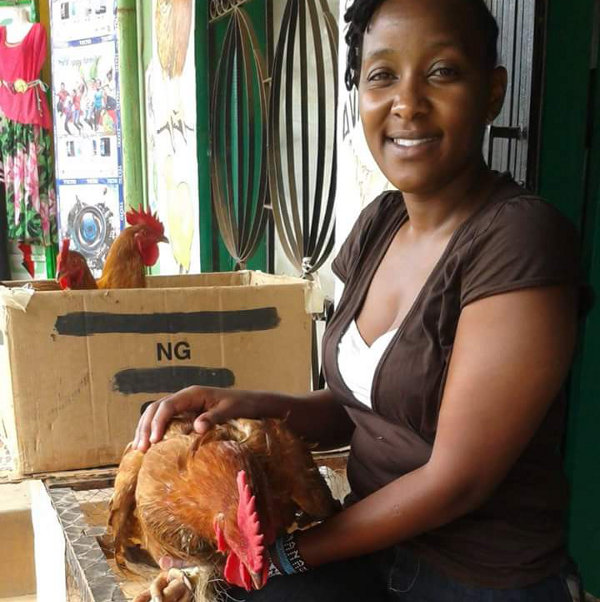Entrepreneurs taking their parents’ businesses a step further
Entrepreneurship is increasingly becoming a career option for young people in Kenya. How we made it in Africa speaks to two young entrepreneurs whose businesses were inspired by their parents’ ventures. Rather than attempting to reinvent the wheel, Christine Kanana (29) and Peter Ndegwa (33) found their winning business ideas from home.
Growing up on a farm inspired Kanana to venture into agriculture. She has added a modern touch to the business, using social media for marketing, introducing her products to formal retail outlets and expanding into pig farming. On the other hand, Ndegwa observed his mother run a small tailoring business. When he started his own venture five years ago, he decided to do textile production on a bigger commercial scale, and has carved a niche in manufacturing school and staff uniforms, as well as branded promotional items and sportswear. Ndegwa has also taken it a step further by participating in multi-million shilling tenders.
Christine Kanana: Getting her hands dirty with farming
Christine Kanana (29) holds a degree in business administration and a diploma in law, but she has focused her energies on running a poultry and dairy farm in central Kenya. Last year she started also keeping pigs.
“I have been told by many I will not make it in farming, that it will take years to succeed, and they give examples of others who have failed in agriculture. But I am passionate about it,” says Kanana. “I want to soil my hands with that dirt. I love farming.”
Kanana explained she pursued studies in business and law to help in running her farming venture.
“Pigs are doing very well because you sell a piglet for Ksh.3,000 (about US$29). One kilogram of pork is going for Ksh.300 ($2.9) and the demand is rising as more people consume higher quantities of white meat for health reasons.”
Kanana’s interest in farming started at a young age. Her parents have been involved in poultry farming for over 30 years. Since she took over running the venture five years ago, she has introduced new approaches, including using social media for marketing and getting some of the farm produce onto supermarket shelves.
“But transportation is a challenge because the main farm is in Meru (more than 200km outside Nairobi) and I want to reach out to consumers in Nairobi. There is also competition from the big shots and as such people are not very welcoming to smaller businesses and brands,” says Kanana.
Still she encourages other young people to take up farming, dismissing the “perception that agriculture doesn’t pay”.
“It all comes down to commitment and passion. Don’t go into farming because you saw someone make lots of money out of it. Yes, we are in business for money – but let it not be the only driving force. You have to make peace with the fact that you will fail at some point and in agriculture it can hit you hard. It can really disappoint,” she warns.
Three years ago she lost thousands of shillings when 2,000 chickens died after an outbreak of a disease she had not taken the precaution of vaccinating against.
“I would get up in the morning to place the feeds and find 50 birds dead. In the afternoon I would find another 50 dead. In two weeks I had lost the whole bunch of 2,000 layers. It was a big loss because I had taken debt, I had bought feeds. If there was a time to give up, that was it. But it inspired me to learn more about viral diseases and how to better manage my risks.”
Peter Ndegwa: Seeing an opportunity in school uniforms
Growing up Peter Ndegwa (31) watched both his parents dabble in business. His mother was a tailor, and his father a marketer. Five years ago Ndegwa founded Veld Trading, a company that manufactures school uniforms, protective clothing, sportswear and branded promotional items.
One lucrative business line has been school uniforms. Veld Trading operates a factory with 20 full-time staffers although the number goes up when there is higher demand.
“We have an outlet in Nairobi where we stock our products. We also participate in tenders,” says Ndegwa. “There is need for us to increase our production levels because demand is high. There is a big dropout rate among pupils in Kenya, and many children do not transition from primary school to secondary school. However, there are always new children joining school. So there is a good flow of new customers every year.”
Unlike general garment production, which has been affected by the cheap imports of second-hand clothes, Ndegwa notes production of school and staff uniforms remains attractive because there are no second-hand alternatives. On average, Ndegwa says each secondary school makes annual orders for uniforms worth about Ksh.2m ($19,600).
Although there are bigger companies involved in the textiles business that do mass production, Ndegwa says he has carved a niche by offering personalised services.
The biggest lesson learnt from his parents is the virtue of hard work. Gaining insight into the textile business from his mother helped him see the opportunity in the industry.
“My parents taught me hard work pays. There is always a client who needs something urgently so you have to be diligent. In entrepreneurship there will be others before and after you who see the same opportunity. What counts is how you differentiate yourself from the rest, and how you position yourself.”



